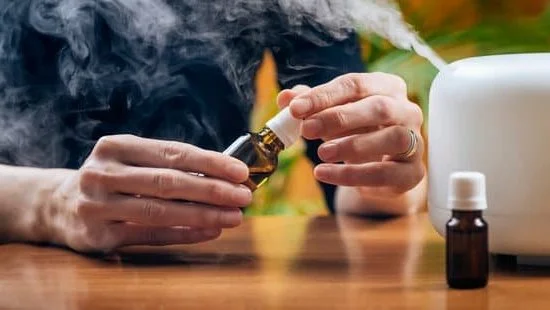Are you wondering, “Can I use aromatherapy clove oil in my mouth?” Aromatherapy clove oil is a popular essential oil with various uses, including for oral health. In this article, we will explore the benefits and risks of using aromatherapy clove oil in the mouth, as well as how to properly use it for oral health.
Aromatherapy clove oil is derived from the clove plant, scientifically known as Syzygium aromaticum. It has been used for centuries in traditional medicine and aromatherapy practices due to its potent antibacterial and antiseptic properties. The oil is commonly used to alleviate dental pain, freshen breath, and promote overall oral health.
One of the key benefits of using aromatherapy clove oil in the mouth is its ability to relieve toothaches and gum pain. Additionally, it has been found to have antimicrobial properties that can help combat oral bacteria and prevent infections. However, there are also potential risks and precautions to consider when using aromatherapy clove oil in the mouth, which we will discuss in further detail.
The Benefits of Aromatherapy Clove Oil
Aromatherapy clove oil is derived from the clove plant, which is native to Indonesia and has been used for centuries in traditional medicine. This essential oil is known for its powerful antiseptic and anesthetic properties, making it a popular choice for various health and wellness purposes. When used properly, aromatherapy clove oil can provide a wide range of benefits for both physical and mental well-being.
One of the primary benefits of aromatherapy clove oil is its ability to effectively relieve dental pain and discomfort. The natural numbing effect of clove oil makes it an excellent remedy for toothaches, gum pain, and oral infections. In fact, many over-the-counter dental products contain clove oil as a key ingredient due to its proven analgesic properties.
In addition to its use in oral care, aromatherapy clove oil can also be beneficial for respiratory health. When diffused or inhaled, the oil can help alleviate symptoms of coughs, colds, and sinus congestion. Its antimicrobial properties can also aid in fighting off respiratory infections. Overall, the benefits of using aromatherapy clove oil extend beyond just oral health and can positively impact various aspects of one’s well-being.
| Benefits | Aromatherapy Clove Oil |
|---|---|
| Relieves dental pain and discomfort | Yes |
| Alleviates respiratory symptoms | Yes |
| Fights off infections | Yes |
Risks and Precautions of Using Aromatherapy Clove Oil in the Mouth
Aromatherapy clove oil is widely known for its many benefits, but it is important to be aware of the potential risks and precautions when using this oil in the mouth. While it can provide relief for toothaches, have antibacterial properties, and help freshen breath, there are some considerations to keep in mind.
One of the main risks of using aromatherapy clove oil in the mouth is its potency. Clove oil is very concentrated and can cause irritation or sensitivity if used undiluted. It is important to always dilute it with a carrier oil before applying it to the gums or teeth. Additionally, swallowing undiluted clove oil can lead to gastrointestinal issues, so it should never be ingested in its pure form.
Another precaution to consider when using aromatherapy clove oil in the mouth is the potential for allergic reactions. Some individuals may be sensitive or allergic to clove oil, so it is recommended to perform a patch test before applying it to the entire oral cavity. This can help determine if there are any adverse reactions before using it more extensively.
Overall, while aromatherapy clove oil can provide oral health benefits, it is crucial to use it with caution and follow proper guidelines for safe application.
| Risks | Precautions |
|---|---|
| Concentrated potency | Dilute with carrier oil |
| Allergic Reactions | Perform patch test |
| Potential for gastrointestinal issues if swallowed undiluted | Avoid ingestion and contact healthcare professional if ingested |
Can Aromatherapy Clove Oil Be Safely Used for Oral Health?
Consulting With a Healthcare Professional
Before using aromatherapy clove oil for oral health, it is important to consult with a healthcare professional. While some individuals may find relief from toothaches and oral pain by using clove oil, it is not suitable for everyone. Individuals with certain medical conditions or taking specific medications may experience adverse effects when using clove oil in the mouth. A healthcare professional can provide personalized advice and recommendations based on an individual’s unique health circumstances.
Potential Risks of Using Aromatherapy Clove Oil in the Mouth
Using aromatherapy clove oil in the mouth can pose certain risks if not used properly. Clove oil is highly concentrated and can be irritating to the mucous membranes of the mouth and throat.
Direct application of undiluted clove oil to the gums or sensitive oral tissues can lead to irritation, burning sensations, and even allergic reactions in some individuals. Ingesting large quantities of undiluted clove oil or applying it directly to open wounds in the mouth can also cause nausea, vomiting, diarrhea, and other gastrointestinal symptoms.
Safe Practices for Using Aromatherapy Clove Oil for Oral Health
If an individual decides to use aromatherapy clove oil for oral health purposes, it is crucial to do so safely and responsibly. The most common method of using clove oil for dental benefits is by diluting a small amount in carrier oils such as coconut or olive oil before applying it to the affected area.
It is important to follow proper dilution guidelines provided by reputable sources and only use a minimal amount on the affected tooth or gum. Additionally, individuals should avoid ingesting large amounts of diluted clove oil, as even small doses can have potential side effects.
How to Properly Use Aromatherapy Clove Oil in the Mouth
Aromatherapy clove oil is a popular essential oil that has been used for centuries for its numerous health benefits. When used properly, it can provide relief from toothaches, promote oral health, and freshen breath. However, it is important to use aromatherapy clove oil in the mouth with caution and follow proper guidelines to avoid any potential risks or side effects.
How to Use Aromatherapy Clove Oil Safely in the Mouth
To safely use aromatherapy clove oil in the mouth, follow these tips:
- Dilute the clove oil: Before using clove oil in the mouth, it is crucial to dilute it with a carrier oil such as coconut or olive oil. This helps to reduce its potency and minimize the risk of irritation.
- Use a small amount: Only a small amount of diluted clove oil is needed for oral use. Using too much can cause burning or discomfort.
- Apply directly to the affected area: If using clove oil for toothache relief, apply the diluted oil directly to the affected tooth and surrounding gums using a cotton swab or clean finger.
It’s important to note that while aromatherapy clove oil can provide relief from minor dental discomfort, it should not be used as a substitute for professional dental care. Always consult with a dentist if you have persistent dental pain or other oral health concerns.
In addition to its oral benefits, aromatherapy clove oil has many alternative uses such as relieving headaches, reducing stress, and supporting overall wellness. When purchasing aromatherapy clove oil for oral or topical use, look for high-quality, pure essential oils from reputable brands to ensure safety and effectiveness.
Alternative Uses for Aromatherapy Clove Oil
Aromatherapy clove oil is best known for its soothing and calming effects when inhaled or applied topically. However, this versatile essential oil can also be used in a variety of alternative ways beyond traditional aromatherapy practices. Here are some alternative uses for aromatherapy clove oil:
- Oral Health: Aromatherapy clove oil contains antimicrobial properties that make it a popular natural remedy for oral health issues such as toothaches, gum pain, and bad breath. It can be used as an ingredient in homemade toothpaste or mouthwash to promote clean and healthy teeth and gums.
- Cleaning Solution: Due to its antifungal and antibacterial properties, aromatherapy clove oil can be added to natural cleaning solutions to help disinfect surfaces and eliminate mold and mildew. Simply mix a few drops of clove oil with water, vinegar, and other essential oils for a powerful DIY cleaner.
- Pain Relief: Aromatherapy clove oil has analgesic properties that can provide relief from muscle pain, joint discomfort, and headaches when diluted with a carrier oil and massaged onto the affected areas. It can also be added to bath water for a relaxing soak.
When using aromatherapy clove oil in any of these alternative ways, it is important to remember that this essential oil is highly concentrated and should be used sparingly. Always dilute it with a carrier oil or other ingredients according to recommended guidelines to prevent skin irritation or adverse reactions.
Additionally, it is crucial to choose high-quality aromatherapy clove oil from reputable suppliers to ensure purity and potency. Look for organic options that have been tested for quality and authenticity. By using aromatherapy clove oil responsibly and thoughtfully, individuals can enjoy its diverse benefits beyond just traditional aromatherapy applications.
Tips for Choosing High-Quality Aromatherapy Clove Oil
When it comes to choosing high-quality aromatherapy clove oil, there are several factors to consider in order to ensure that you are getting a safe and effective product. Here are some tips for selecting the best aromatherapy clove oil for your needs.
Look for Pure and Organic
It is important to look for aromatherapy clove oil that is labeled as pure and organic. This ensures that the oil has not been diluted or mixed with any synthetic ingredients, preserving its natural benefits. Look for products that have been certified organic by reputable organizations.
Check the Extraction Method
The extraction method used to obtain clove oil can impact its quality. Steam distillation is the most common method for extracting essential oils, including clove oil. This method helps preserve the purity of the oil and maintain its beneficial properties. Avoid products that use chemical solvents in the extraction process.
Consider the Packaging
High-quality aromatherapy clove oil is typically packaged in dark glass bottles to protect it from light and oxidation, which can degrade its quality. Additionally, look for a product with a secure cap to prevent leaks and ensure proper storage.
By following these tips, you < can i use aromatherapy clove oil in my mouth >ensure that you are choosing a high-quality aromatherapy clove oil that is safe and effective for use in your mouth or other applications.
Conclusion
In conclusion, aromatherapy clove oil can be a beneficial and effective natural remedy for oral health when used properly. The benefits of using aromatherapy clove oil in the mouth include its antiseptic and analgesic properties, which can help alleviate toothaches, reduce gum inflammation, and combat bad breath. Additionally, the oil has been found to have antimicrobial properties that can aid in fighting oral infections.
However, it is important to be aware of the potential risks and precautions associated with using aromatherapy clove oil in the mouth. Undiluted or excessive use of clove oil can cause irritation to the oral tissues, so it is crucial to dilute it properly with a carrier oil before application. Furthermore, individuals with specific medical conditions or allergies should consult with a healthcare professional before incorporating aromatherapy clove oil into their oral care routine.
When considering using aromatherapy clove oil for oral health, it is essential to follow proper usage guidelines. This includes diluting the oil appropriately, applying it directly to the affected area, or using it as an ingredient in homemade dental products such as mouthwash or toothpaste. Ultimately, while aromatherapy clove oil can provide natural relief for common oral health issues, it should not replace professional dental care and regular oral hygiene practices.
Frequently Asked Questions
Can You Ingest Clove Essential Oil?
Ingesting clove essential oil is not recommended as it can be toxic in large doses and cause irritation to the skin and mucous membranes. It’s best to use this oil externally or aromatically.
What Can You Do With Clove Essential Oil?
Clove essential oil has various uses including providing relief for toothaches, promoting healthy gums, alleviating respiratory issues, reducing inflammation, acting as a natural insect repellent, and aiding in digestion. It can also be used in homemade cleaning products for its antimicrobial properties.
What Is the Use of Clove Essential Oil in Breath Spray?
The use of clove essential oil in breath spray is due to its natural antibacterial and antiseptic properties, which can help freshen breath by killing bacteria that cause bad breath. When diluted properly, it can be a safe and effective ingredient in homemade breath spray or mouthwash.

Are you looking for a natural way to improve your health and wellbeing?
If so, aromatherapy may be the answer for you.



